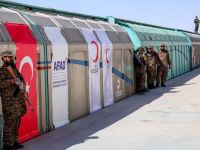By Munir K. Nasser
Chief Correspondent, Washington, DC
Albawaba.com
A former senior US diplomat called on the United States to stop “monopolizing” the Middle East peace process and “open the door broadly for the participation of Europe and the UN.”
Richard Murphy, a Senior Fellow for the Middle East at the Council on Foreign Relations in New York, and a former Assistant Secretary of State for Near Eastern Affairs, told Albawaba.com in an interview that if the violence continues between Israel and the Palestinians “it might suck in Syria” and Iraq. however, he added Arabs are not ready for another war, but “accidents have happened in the past.”
Murphy, who served as US Ambassador to Mauritania, Syria, the Philippines, and Saudi Arabia, said the new US president would be reluctant to engage in the Middle East because of the limited accomplishments of the Clinton administration. This, he warned, may result in less US top-level involvement in the peace process.
The following are excerpts from the interview, which was conducted at the Council on Foreign Relations in New York:
Q- How do you see the peace negotiations going from here in light of the current Intifada and the last days of the Clinton administration?
A- I just wrote 790 words which put the problem in complete context and perspective which basically argues that America better stop being so possessive of the peace process. I think I avoided using the word credibility because every Arab I know says ‘you have got no credibility’ and on second thought, it is true. I am just tired of the word. I don’t think there are too many ideas out there about the peace process other than the ones developed by the peace process team. The fact that America is spotlighted as owning, possessing, and monopolizing the peace process, does not help these ideas. My suggestion was: let’s open the door more broadly to the participation of Kofi Annan, the Secretary General of the UN, in his personal capacity, not the entire UN bureaucracy, and perhaps to the European Union. Not that either one of those would bring any great ideas, but I think they will help persuade, particularly the Palestinians, and also the Israelis, that the time has come [to stop the violence].
Q- How can they stop the killing?
A- [They] can go on killing for a long time. It doesn’t take a lot of money to kill five or six Palestinians each day, and the Israelis will die in smaller numbers. The ratio seems to be eight Palestinians to one Israeli. That can go on, but why? Is it that neither party is really ready for political settlement? Israel is very divided. In September before the violence, Arafat’s expectations were always far higher than his achievements. So within his own community there’s the question of can he ever reach what he wants?
Q- If the killing goes on between the two sides, would you expect it to lead to another war between Israel and the Arabs?
A- The killing can go on, and it might suck in Syria, and Iraq who would love to convince the Arab world that it is ready to send its 500,000 volunteers to fight [Israel]. I don’t think that the Arab world is really ready for another Arab-Israeli war and I don’t think the Israelis want it. But it could happen. Accidents have happened in the past.
Q- Many analysts say there is a danger that the conflict may turn into a religious war between Arabs and Israelis. Do you agree with them?
A- There is a danger that this may become Islam versus Judaism. It is not there yet. I must say that when I was in Saudi Arabia in October when the fighting was at its height, a comment was made behind closed doors, and I won’t mention the name, that the solution to Jerusalem is to keep religion out of it. The solution is to talk to the administration about political arrangements. Because if it goes to religion, it is never going to end.
Q- Can the proposals discussed at Camp David be a basis for a settlement?
A- Camp David was rushed. Camp David was unprepared on the Palestinian side. Barak demanded something that Palestinians could not deliver which was an end to the conflict and to all claims. Maybe his explanation was inadequate for the Palestinian public to understand . I think our mediation has shown the limits of mediation. I think by putting the two parties together at Camp David [has shown] these were issues that could only be worked out between the two sides. I am looking for results, not for continued mediation
Q- How do you think the new US president will deal with the Middle East conflict?
A- The one thing I can predict is this: whether it is Gore or Bush sitting in the Oval Office on January 21st, looking at the problems the President has to deal with worldwide, he will try to look back at what Clinton tried to do and the personal investment that he made outside of the prestige of his office and say what it accomplished. We have now 300 dead and nobody is about to sign an agreement. Both men will only be human when they say: look, we have problems in Asia, Africa, and in Latin America; should I invest what Clinton did with the limited results that Clinton achieved? In that sense, what concerns me is that there will be less top-level involvement. That doesn’t mean the US will abandon the Middle East. It can’t, because our interests are very substantial [in the region].
Q- Where would the two parties go from here?
A- I don’t have the quick answer myself. I can understand the Palestinian attitude considering that they are being asked to negotiate 20 percent of Palestine. The virtue of Camp David was they were locked up together and had to confront each other and some ideas came to life which neither one had been willing to talk about before. For 50 years most of those issues have been absolutes all through the way: no compromise. At Camp David they saw each other’s positions. There has to be compromise.
Q- When do you think Arafat will declare a Palestinian state?
A- My prediction is that there is going to be a Palestinian state next year. That is worth a great deal coming from someone who predicted that there is going to be a Palestinian State this year. So my timing is not perfect. The question is what kind of state? Is it going to be a state with contiguous territory? Or is it going to be the common accusation that Israel is going to continue its’ apartheid policy ala South Africa? Barak said he intends contiguous territory. A Palestinian state is coming. The Israelis are over the hurdle on the issue of statehood. They have come to terms with that. While the Palestinians exist politically not because of their blood or family ties or their history of ancient times, but because they have been beaten on by Israelis and by Arabs, and rejected by both. They are going to find their way to statehood.
Q – Who will be Arafat’s successor in the US thinking?
A- I don’t see any successor in part because Arafat never developed a successor. I think everyone sees Abu Mazen as the interim successor, and there will be the competition between the Tunisians and those who never left [Palestine]. But Arafat has done no better than any Arab leader in training a successor. I think President Clinton made a big mistake when he was critical of Arafat publicly after Camp David. The Israelis are very uncomfortable dealing with him, and they don’t trust him.
Q- What are the chances of Barak surviving the current crisis and winning the elections?
A- Barak is a failing figure in Israeli politics, and because of the way things are going, you may well have in the middle of next year Bibi Netanyahu as prime minister of Israel. And in him a man who is capable of adopting many different positions. But instinctively, Netanyahu is very opportunistic and he may pick up some of Barak’s policies. But it does not look promising for a settlement satisfactory to the Palestinians. Barak is the first prime minister who talked about Jerusalem as a shared capital between the two states. Even Leah Rabin attacked him on that position before she died. Barak may get elected if he only presents a platform to the Israeli voters which would include a document on the independence of Palestine.
Q- What do you think of the sanctions against Iraq?
A- Sanctions have become a favorite instrument of Clinton’s foreign policy, as the Clinton Administration has sanctioned more countries in eight years than his predecessors sanctioned in 60 years. I like to think we [at the Council for Foreign Relations] have added to the debate on that issue. You now find there are Congressional discussions on sanctions and what to do with it. As a very sound principle, before any country is the target of sanctions, the administration has to come to the Congress and describe the benefits they foresee and the cost of sanctions. And Congress itself is guilty in a sense for these sanctions because they could pass a law and get the President to sign it.
© 2000 Al Bawaba (www.albawaba.com)







